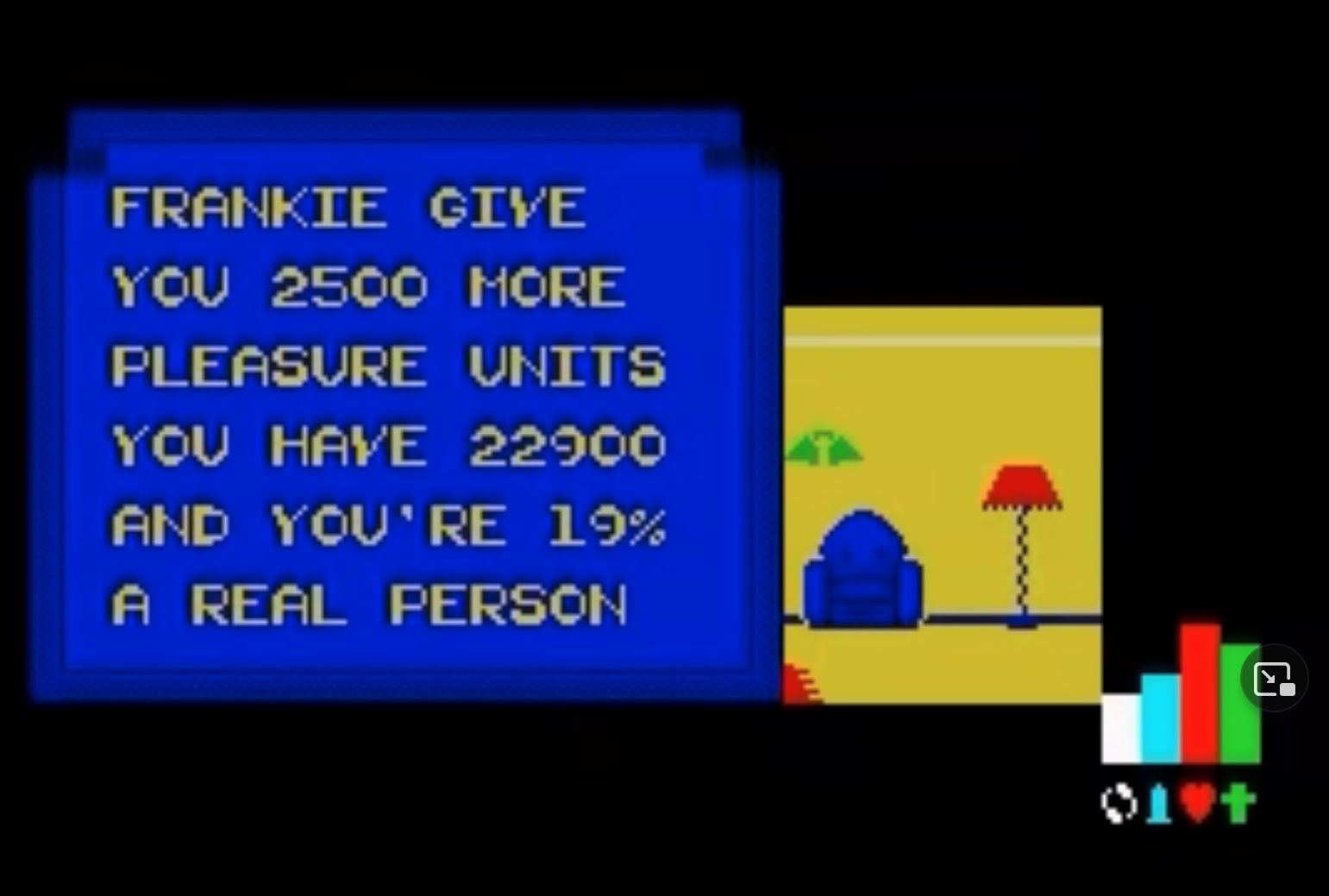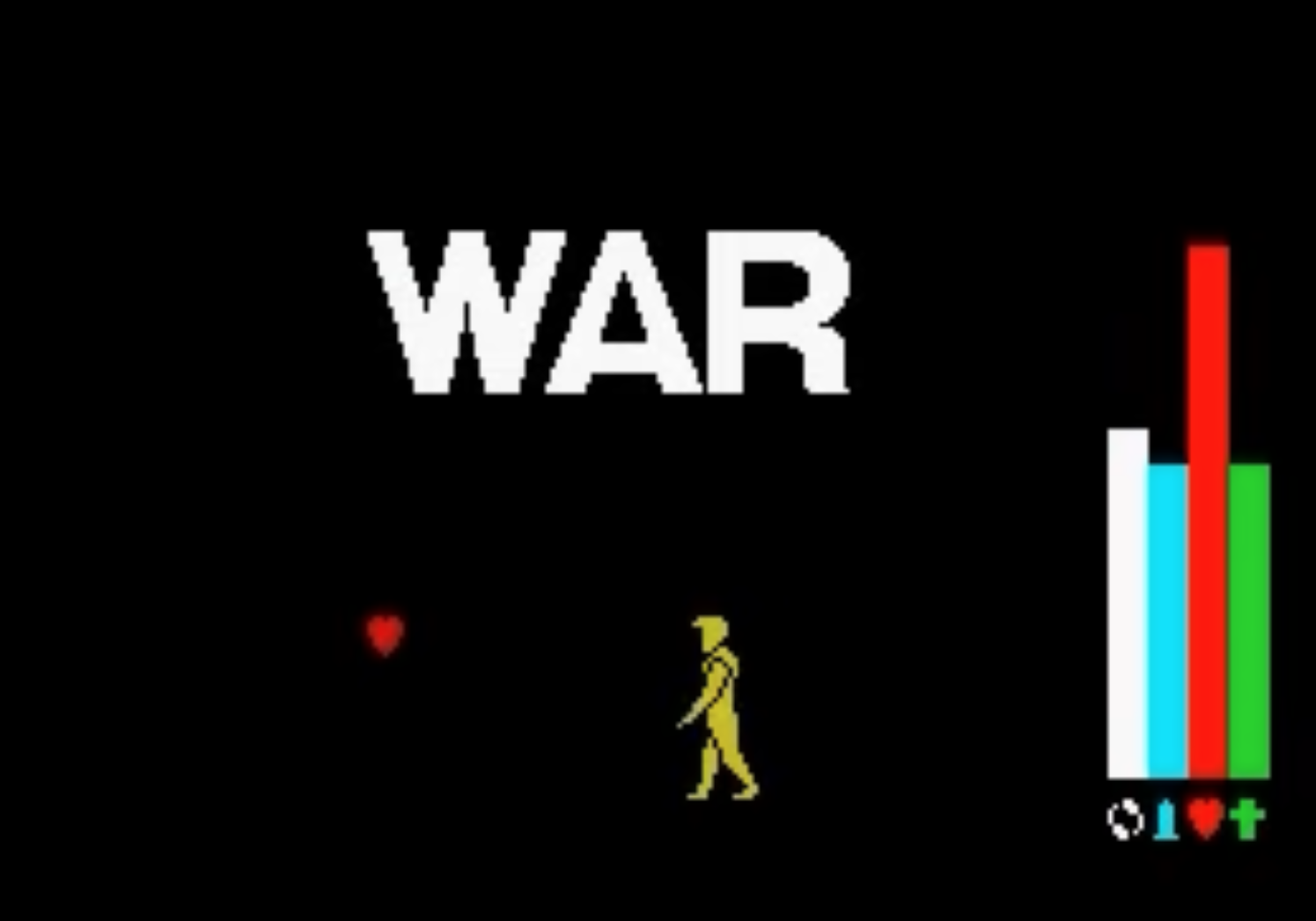Points That You Can Score
Oct 23, 2022 · 5 minute readLet’s talk about something different this week - two transcendental moments in computer games. One a long time ago, one as late as this week.
Games based around pop bands were not exactly filling the shelves in the 80s, but they were more common than you’d might expect in the heyday of the UK computer game market. And given that most licensed titles chase the cash before the fad dies down, you’d be forgiven if you thought Frankie Goes To Hollywood1 would be something like “DJ Mike Read has stolen the master tapes to Relax! Find the tapes in five levels of platforming action! Absolutely brilliant!”
Instead, you play as a Nobody in Mundanesville, a suburb of Liverpool, determined to become a Real Person and enter the Pleasuredome. But of course you do. But while the open world you are exploring seems to be a never-ending set of identical terraced houses on similar streets, a different world is hidden in full view - by interacting with the objects within houses (lamps, TVs, etc), you trigger portals sending you into abstract mini games, where you will bounce symbols into energy barriers, take part in a shooting range of world leaders, try to rebuild the ZTT logo, defend Liverpool from air attacks in WW2, or race along an infuriating set of pot holes that transport you to another part of the screen. And every time you succeed in one of your tasks, Frankie will award pleasure points. You need 99,000 of them to enter the Pleasuredome.

It is, in short, completely bewildering and mesmerizing. An open world computer game in 1985, where the mundanity of the real world can give way to the fantastic in a matter of seconds. The developers, Denton Designs, were formed from the core of Imagine after that company went bust with their grandiose Bandersnatch designs, and the game actually has a lineage of code stemming back to that original failed effort via their first game for Ocean, Gift From The Gods. One thing that I have been curious about over the past few decades is: just how much input did Paul Morley have on this? Because if you sat down and thought about what sort of obtuse game the Morley of 1985 would come up with, this is exactly what he’d do2.

About half-way through the game and you’ve got a handle on things. You’re playing these mini games, picking up useful objects, increasing your stats. And then you enter a house, just like all the other houses. Twenty-seven churches and silver birches. But there’s a dead body in the sitting room. And suddenly the game becomes a whodunnit. The game doesn’t really change that much - only that when you enter houses or rooms, you might now get clues on all the possible suspects, but it absolutely electrified me as a seven-year-old, building up a web of suspects while trying my hardest to become a Real Person3 on my Spectrum4.
This week, No Man’s Sky. I’m still very much in the early game on the Switch, trying to scrape together credits and building a small, respectable base (we won’t talk about my first attempt, which was a wooden structure built on a hill that you had to use a jetpack to even get to the door). Anyway, I was at a trading post on a new planet I’d discovered, trying to convince an alien to help me with co-ordinates I had been given to locate somebody else deeper in the galaxy. But they wouldn’t talk to me because I didn’t have enough standing with their faction. Which was rather annoying. The game suggested I fly up to the space station in the solar system to take on a few missions to increase my standing and come back when I had enough clout.
I started trudging towards my ship when sirens sounded. Two ships appeared in the sky, raking the outpost’s metal panels with plasma fire. I ran to my ship, took off, and defended the facility against the two raiders in a dogfight that went from trading shots in tight canyons on the planet’s surface to circling each other in the upper atmosphere. Eventually, I shot them both down, landed back at the station…and my standing had increased to the point that the alien was now more than willing to talk to me about those co-ordinated. In that moment it was like all the promises that games such as Elite had been making had come true after all these years. Not just a pretty 3D interface pasted over a spreadsheet (hello, Eve Online!), but a living world where the pirates don’t just attack you, and where you’re feel to help or not depending on how you feel.

Computer games! They can be quite good sometimes!
-
I think Americans don’t really understand how massive Frankie was in the UK during 1985. Probably not helped by the band’s total collapse in the wake of their second album, I guess. ↩︎
-
According to this Eurogamer retrospective, Denton Designs did talk to Morley, so my feeling may not be entirely crazy. ↩︎
-
I never did become a Real Person, sadly, but I came close. Around 95% and the full BANG maxed-out stats. Also, I know the murder is telegraphed in the manual, but like every other child in the UK during that time, I had an extensive collection of C90 tapes. ↩︎
-
Sadly, the C64 version is probably the definitive version, as Denton used the extra memory for back gardens and a couple of additional mini-games. It’s a shame that FGTH imploded so quickly - a 128K Speccy remix version that included those extra bits and some AY versions of Relax / Two Tribes would have made the Spectrum version stand out far above the breadbin, and besides, a remix would fit in so well with ZTT’s attitude of ‘let’s just release a remix every other week, lads!' ↩︎